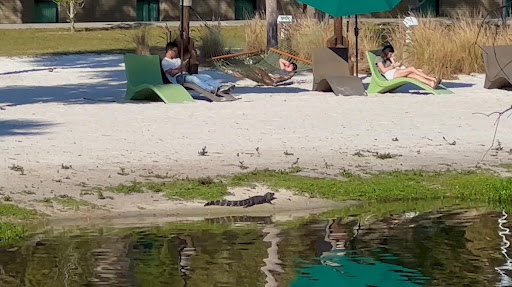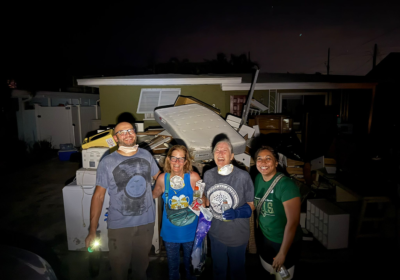Why can’t you swim at USF’s Castor Beach? Alligators and dirty water.

What could be the consequences for students found swimming at Castor Beach?
In short – gator encounters and disciplinary actions may lie in the wake.
Aaron Nichols, USF spokesperson, said Castor Beach was built 25 years ago as a place for the campus community to relax, socialize and study — but not to swim in.
Castor Beach’s pond is necessary for the on-campus infrastructure because it is responsible for capturing stormwater when it rains, he said.
“It’s not that the water is dirty or polluted,” Nichols said. “It’s just that when it rains, the water has to go somewhere, and it goes into the pond.”
Crystal Sullivan, Environmental Health & Safety director, said water quality testing is not conducted at Castor Beach since it wouldn’t certify that the pond would remain safe to swim in.
Regarding potential diseases, Sullivan said there is always a risk of different types of bacteria growth since the pond is a small body of water with limited movement within it.
Junior Caitlin Coyle, an environmental science and policy major, said some students took water quality test samples from the pond last year for one of her classes. The specimens turned out to be dirty and muddy.
Even though Coyle said she chose to never swim at Castor Beach after seeing the samples’ results, a shocking encounter in February only helped confirm her decision.

Coyle was walking with a friend when she decided to take a picture of Castor Beach’s fountain and noticed the presence of a small alligator surrounded by students, she said.
“My first instinct was to record and take pictures because alligators at Castor Beach were always just a suspicion, so seeing it in person was kind of crazy,” she said.
Coyle said none of the students at Castor Beach saw the alligator because it wasn’t moving. She said the animal was calm and didn’t look like it wanted to interact with people.
Ever since the first encounter, Coyle said she has seen the alligator every late afternoon when she walks by Castor Beach, and it is usually in the same spot captured in the picture.
Sullivan said there is a legitimate concern about the presence of alligators at Castor Beach and that a different small alligator was removed from the pond last year.
Nichols said students can report alligator encounters on the Administrative Services website. The department will then take a look and ultimately call the Florida Wildlife Commission for a safe removal.
Two days after Coyle’s alligator encounter, three men were seen cheering a friend up while he swam from one side of the pond to the other. It was not confirmed if they were USF students.

Nichols said if university employees or University Police (UP) see someone swimming in the pond, they will first ask the person to get out and explain why they shouldn’t be in there.
If they are a student and refuse to get out, they’re going to get referred to the Office of Student Conduct & Ethical Development. Based on the severity of the charges, some possible consequences could be suspension and even expulsion.
If they are not a student and refuse to get out, they will be trespassed by UP — meaning they won’t be allowed on campus again. If they come back, that could ultimately escalate to an arrest, Nichols said.
Coyle said it’s important to prohibit swimming at Castor Beach because sometimes disciplinary actions are the only way people won’t do something.
She said that by not swimming in the pond, people are choosing to respect nature and the animals that call Castor Beach their home.
“Obviously, our campus is open to more than just Bulls — we have gators now, too,” Coyle said.






